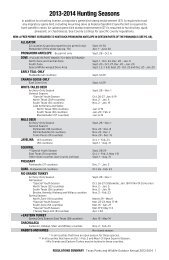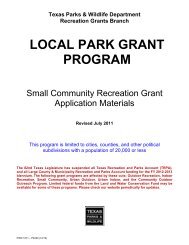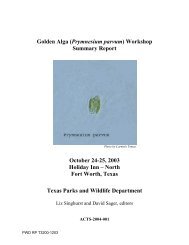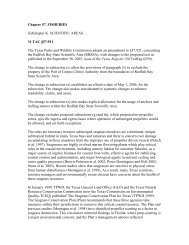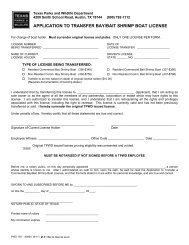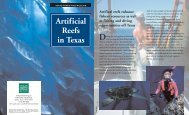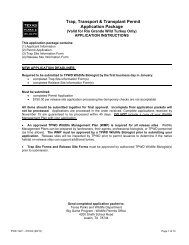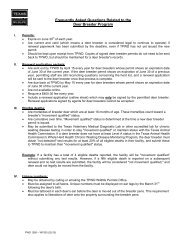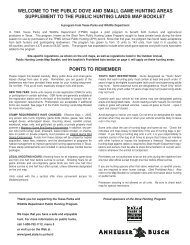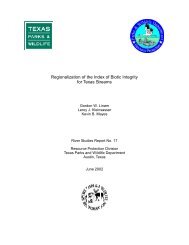1-1 Appendix 1 Responses to survey questions administered to ...
1-1 Appendix 1 Responses to survey questions administered to ...
1-1 Appendix 1 Responses to survey questions administered to ...
Create successful ePaper yourself
Turn your PDF publications into a flip-book with our unique Google optimized e-Paper software.
• Weakness is the random sample design that limits the application of critical<br />
analyses <strong>to</strong> other types of practical studies (i.e., catch and release). However,<br />
separate special studies are often available <strong>to</strong> perform these types of<br />
investigations.<br />
• Weakness – some addition sampling is needed in the near shore Gulf, Human<br />
Dimensions, etc. but staff and budget constraints will not allow for this at this<br />
time.<br />
• The greatest weakness is inherent in the design—we have a tremendous amount<br />
of data on common species, and less data on less common species. Also, as a<br />
species declines and we need <strong>to</strong> know more, we have less data.<br />
• Weakness: Difficulty in redirecting research/assessment focus quickly for shortterm<br />
issues. Requires clear evaluation of tradeoffs since rarely can both be<br />
financially supported for long.<br />
COASTAL ADMINISTRATION-- QUESTION 3.<br />
RESPONSES: 8<br />
What is the most pressing issue anticipated in the next 10 years that will require<br />
science-based input from the agency?<br />
• Reduced fresh-water inflows in<strong>to</strong> bays and estuaries.<br />
• Freshwater inflow in<strong>to</strong> coastal ecosystems is the number one issue, and this will<br />
require significant amounts of science-based input.<br />
• Water and its management in Texas.<br />
• Insuring there is enough freshwater inflow <strong>to</strong> maintain estuarine health. The<br />
increasing pressure of sport anglers on fish populations.<br />
• Protection of health of aquatic ecosystems in water management decisions.<br />
• There are four pressing issues in the next 10 years:<br />
1. Continued pressure on resources (such as fisheries harvest).<br />
2. Continued habitat alteration and/or loss.<br />
3. Continued changes in (loss of) freshwater <strong>to</strong> the estuaries.<br />
4. Continued need for public education.<br />
1a. We have a fairly good handle on #1. We can adapt as data indicate.<br />
Growth in human populations on the coast may create pressures we are<br />
unprepared for. For instance, this may lead <strong>to</strong> catch and release fisheries<br />
in come recreational species, and certainly a curtailment of many<br />
extensive commercial fisheries.<br />
2a. We have a poor handle on #2. Although agency is involved in its<br />
own habitat protection/enhancement projects and is involved in habitat<br />
permit review process, I am unaware of global studies assessing<br />
cumulative impacts of all little projects within an ecosystem. This is<br />
critical if we want <strong>to</strong> do something proactive.<br />
3a. We are involved in this arena, unfortunately with little regula<strong>to</strong>ry<br />
teeth, but with great expertise and interest. We must maintain our<br />
presence, enhance our understanding, and commit our resources for<br />
more and better data.<br />
2-3



